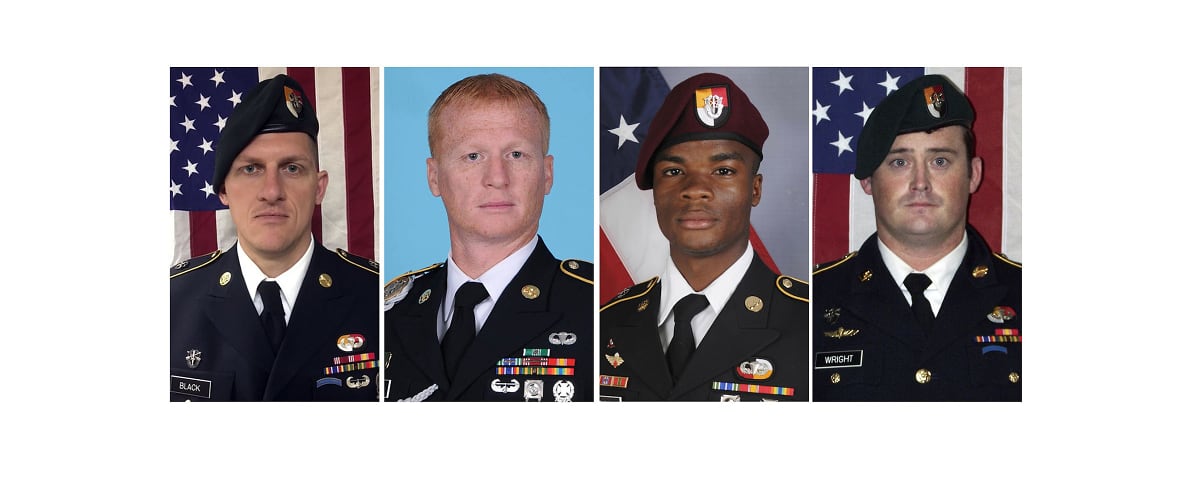In a televised Pentagon briefing, the commander of U.S. Africa Command laid out the bottom line for the October Niger ambush that killed four U.S. soldiers: “The responsibility is mine,” Marine Gen. Thomas Waldhauser said.
But the mistakes that led to an outmanned and outgunned convoy of U.S. and Nigerien forces getting overrun last October were widespread, took root before the unit ever deployed, and manifested in local commanders deciding to carry out a capture or kill mission that they never had the authority to do, a 6,300-page investigation has found.
An unclassified eight-page summary was released Thursday.
“The direct cause of the enemy attack in Tongo Tongo is that the enemy achieved tactical surprise there, and our forces were outnumbered approximately three to one. So there’s a series of findings that we have identified from pre-deployment training through the relief in place,” said AFRICOM’s chief of staff, Army Maj. Gen. Roger Cloutier, who led the investigation.
Staff Sgt. Bryan Black, Staff Sgt. Jeremiah Johnson, Sgt. La David Johnson and Staff Sgt. Dustin Wright were killed in the deadly attack.
The ambushed team had been on the ground for about a month. The failed overnight mission that took place Oct. 3-4 was their third since arriving in-country, but the first involving a capture-or-kill of a high-value target.
RELATED

The team was pursuing Doundou Chefou, an ISIS-connected militant who’d had a role in the kidnapping of American aid worker Jeffery Woodke in Niger in 2016. Despite media reports that Chefou has been apprehended Nigerien forces, he is still at large, Waldhauser said Thursday.
“That particular individual they were after had notorious connections to all kinds of various violent extremist groups in the Mali-Niger area,” Waldhauser said.
Since the ambush, no other capture or kill missions have been approved by any AFRICOM components, Waldhauser said.
The investigation had 23 findings, most of which have not been released. Three involve the ground commanders involved with filing and approving the paperwork for the mission.
However, the investigation does not make recommendations for any type of punishment, instead referring any disciplinary action “to [U.S. Special Operations Command] for appropriate action.”

Only a short, unclassified summary of the investigation has been released so far, but Waldhauser and Cloutier described some of the major factors Thursday.
Mission preparation: The investigation found that the team leader of the 11 U.S. troops who were ambushed had joined the team late in the deployment cycle, limiting time to do left seat/right seat training with the outgoing team.
Moreover, once they were on their own, the new team had not completed necessary mission rehearsals, nor had they done the work to socialize and integrate with the Nigerien partnered forces prior to conducting the mission.
The team “did not meet the appropriate standards for familiarization and integration with the Nigerien partner force prior to conducting the initial mission. ... Basic social-level, routine tasks, such as conducting rehearsals, remediate action drills upon enemy contact were not completed,” Waldhauser said.
Action taken: Defense Secretary Jim Mattis, who approved the investigation’s findings, has directed “Special Operations Command in Tampa, Florida, and the United States Army to address matters related to organizing, training and equipping of Special Operations personnel for deployments.”
Lack of authority: The team was authorized to perform key leader engagements, training and advising, not capture or kill. The team commander and company-level commander at the forward base handling the mission mischaracterized what the forces would be doing in mission paperwork as “civil military reconnaissance.”
Had the paperwork accurately stated it was a capture or kill mission, a higher level of review would have been required. However the investigation found that the commanders who filed the paperwork were not intentionally deceptive.
“The paperwork that was submitted, the packet was identical to a previous [concept of operations]. So it was done hastily, and there was a lack of attention to detail,” Cloutier said. “It wasn’t a deliberate intent to deceive, it was lack of attention to detail.”
Action taken: AFRICOM directed a comprehensive review of the concept of operations process used by the special operations components to eliminate confusion over proper approval authorities and improve oversight.
Proper equipment: During the ambush, the vehicles were vulnerable, and the team ran out of ammunition. A previous assessment had determined that armored vehicles were not needed, but those teams “should have that option” if the roads can handle them, Waldhauser said.
Action taken: “One of the things that this investigation brought out, and we immediately directed, that armored vehicles be given to those teams as an option. They should have the choice,” Waldhauser said.
In addition, AFRICOM has requested “increased firepower for force protection,” he said, without giving specifics.
Tara Copp is a Pentagon correspondent for the Associated Press. She was previously Pentagon bureau chief for Sightline Media Group.




